 Welcome!
Welcome!I recently went on a walk in Katong, an area in the East of Singapore, near the sea, that does not fit the common image of Singapore as a modern, sterilised city. Back alleys often offer some unexpected and interesting photo opportunities.
Come with me on the walk and see another side to Singapore.
This house is on Joo Chiat Road. It is possibly owned by Malaysians as the warrior statue in the front garden is Malay. He is carrying a kris sword in its scabbard.

Traditional barbers shop, also selling
statues
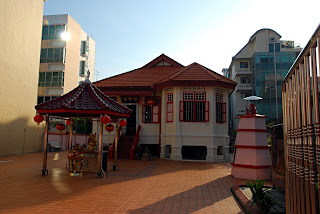
The morning light catches this house nicely.
A Buddhist shrine stands right in front of the
entrance. On the right is a chimney where the
Chinese worshippers usually burn prayers and
offerings

The front room really is the front room. Katong
was the location of many villas and mansions of
the wealthy elite in the late 19th to the mid
20th centuries

A more traditional shophouse front. Katong is
famous for its Eurasian and Peranakan
(Straits Chinese) communities and restaurants

These terraced houses are very traditional.
I haven't seen any others like this in Singapore

The houses have been recently
restored
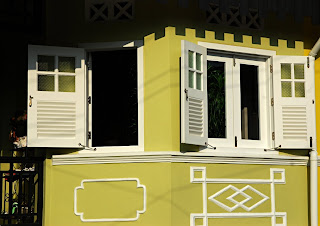
Something special that has been preserved
in this modern city

Love this colourful fence

A green form of transport with a very green
passenger!

The whole street has these half doors and
half windows
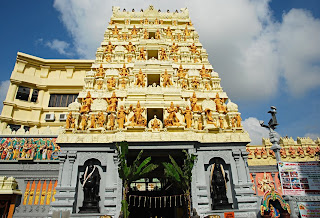
In the heart of Katong there is also a Hindu
temple called Sri Senpaga Vinayagar Temple
It represents the Ceylonese Hindus who were
one of the earliest groups of immigrants in
Singapore

The temple is situated on Ceylon Road. Lord
Vinayagar is more commonly known as Ganesha
the Elephant God. It is the second oldest temple
of Singapore, although it has been restored on
several occasions

The morning sun falls on this little shrine
at the entrance to the temple
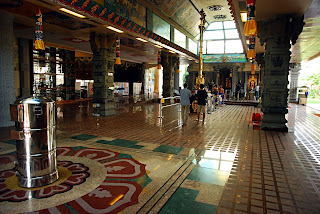
The temple is built following the architectural
style that was favoured in the ancient Chola
kingdom of India. This is the Inside of the temple
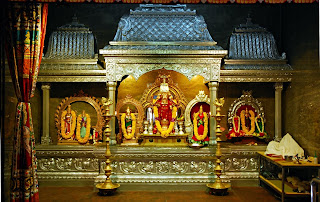
Lord Vinayagar represents knowledge and is
considered to be the remover and destroyer of
obstacles

These ladies adorn the left wall to the side of
the entrance
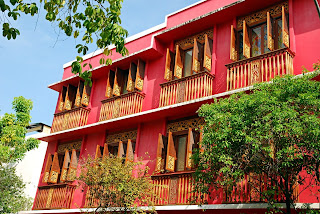
Great colour and lovely windows

The damage to the window looks like a gunshot?

Fabulous building
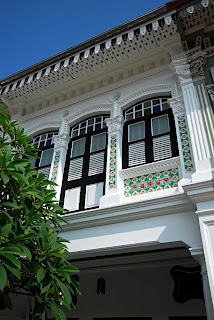
Detail of a beautifully refurbished
shophouse
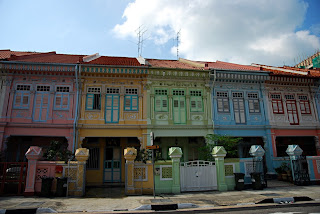
More colourful shophouses on the other side
of the road

These staircases at the back
are traditional
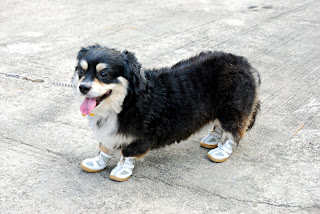
I posted these chappies on facebook. Just
dig the footwear!
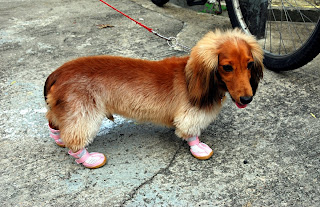
The owner explained that the pavement gets
very hot so their paws need protecting

Another example of the traditional
back staircase

Now a few back alley photos

Fantastic urns, possibly used for burning. You
can see a grate on the side of the urn at the bottom
on the right

A metal door provides interesting
reflections of what's in the alley

A doormop!

Fancy a tartlet?
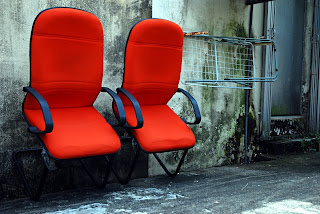
Chairs that have probably been washed and
put out to dry
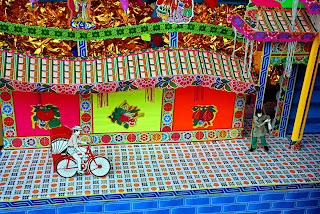
Ceremonial products for burning at Chinese
funerals are an important part of burying the dead.
Most traditionally people burn paper (fake) money

The reason is that the deceased will
need money in the afterlife. Recently,
more and more elaborate paper
constructions of cars, electronic gadgets
and even houses and maids can be bought
to burn and ensure the deceased has a
luxury afterlife!
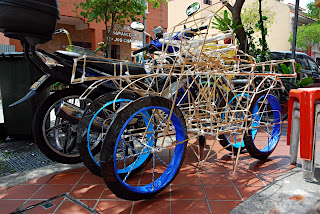
"Motorbikes" for burning
Thanks for coming. Next time some photos of
Spring in a UK park
1 comment:
Dear Alan,
We would like to seek your permission in using one of your photos for our Facebook cover photo.
Could you please get in touch with me at nchan@golinharris.com
Post a Comment